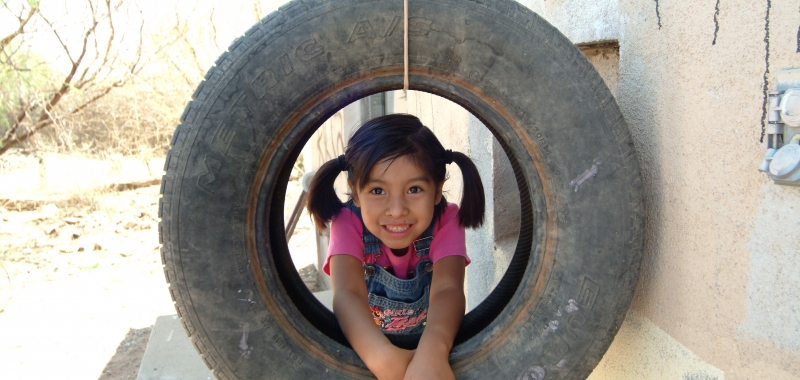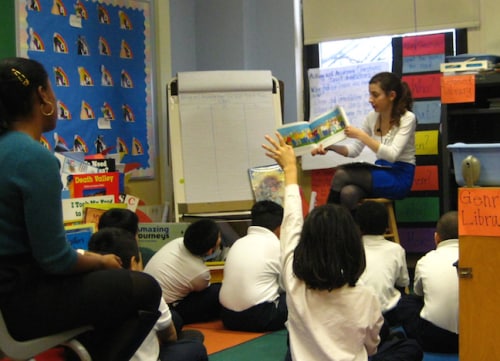The Raising of America: Improving Student Outcomes from Outside the Classroom
Genevieve Guyol was a Teach for America member in Chicago in 2013, where she taught first and second-grade special education. She is currently a third-year medical student at Boston University School of Medicine. Read her blog, featured on the Teach for America website, to learn more about how her experience in the classroom has shaped her interests in medical school and desire to create interdisciplinary partnerships with medical providers, teachers and schools in order to affect change on a much broader, systemic scale.

On my first day as a Teach For America teacher in Chicago, it was Juan’s first day of first grade. He smiled as he sat drawing at his desk with his feet dangling because his chair was too tall. When I first met Juan, I assumed that his difficulty expressing his thoughts was related to being in a new school and that he would open up as he became more comfortable in the classroom.
As I figured out the interventions that helped other students grow as learners, I struggled to unlock Juan’s potential. Even after a few weeks of school, he continued to have difficulty communicating and would speak in short three- to five-word phrases. On good days, his peers and I could understand what he was trying to say and fill in the gaps. On the more challenging days, Juan would start crying because he was so frustrated with his inability to express himself.
In talking with Juan’s mother, I learned that he had not always had such trouble communicating. However, after witnessing a traumatic event as a toddler, Juan’s language development halted. He was referred to early intervention, but his services did not include social work. Additionally, transportation challenges prevented his mother from getting him to speech and mental health appointments.
Juan and his family received neither the early childhood supports nor the wraparound services they needed to support his language, social-emotional, and academic development. Though Juan has made some progress since that first day of first grade, his development still lags behind where it should be. I'm happy to see his growth, but I wonder what would have been different if he and his family had received more early childhood support.
During my time in the classroom, I saw so much of the problems and so many of the shortfalls in early childhood education, especially regarding how we accommodated our kids with disabilities. Now, as a medical student, I see the ability to connect my knowledge from my TFA corps member experience to work in partnership with teachers and schools in order to affect change on a much broader, systemic scale.
In other words, it's not a matter of teaching and then leaving your relationships with the students and community behind. Rather, you teach and gain so much respect for what’s done in the classroom—and you see how teachers and student outcomes can improve by providing them with the right resources.
High-quality early childhood programs require substantial investment. We need excellent teachers, inspiring facilities, and activities that will challenge and strengthen the brains of preschoolers with rapidly developing neural connections. For every dollar we invest, the return is between $4 and $9 when we consider increased earnings and income taxes and savings in criminal justice, special education, and welfare programs.
Neuroscience research also emphasizes the necessity of these programs. The formation of neural connections in the brain occurs in a hierarchical fashion. Sensory pathways of vision and hearing develop during the first months of life. Formation of neural connections supporting language development peaks around nine months. Most of the connections in pathways of higher cognitive function are formed around the time of preschool or even slightly earlier. We must support families and children during the earliest years so that kids achieve developmental milestones that will set them up for success later in life.
My belief that Juan’s story could have been different and the inspiration that I draw from the research surrounding early childhood interventions are the reasons for my engagement with this topic as a medical student. I'm excited that the documentary series, The Raising of America, created by California Newsreel for national broadcast by PBS stations, is catalyzing conversation about the importance of early childhood education and what we can do as a society to improve children’s beginnings.
This documentary features an interdisciplinary group of researchers, professionals, and parents who discuss this issue. Patients at Boston Medical Center, the teaching hospital associated with my medical school, and one of my mentors, a pediatrician, are featured in this program. Recently, a screening of The Raising of America at the Massachusetts Statehouse encouraged conversation about how we can best address this topic and improve outcomes for kids and families.
The Raising of America provides a synthesis of the research related to early childhood interventions and how this issue affects families. Parents discuss the challenges of cost and availability that are involved with finding program spots for their children. Neuroscientists, pediatricians, and economists outline the research that emphasizes the importance of early childhood interventions.
This program is useful both as an educational tool and as encouragement for each of us to find the role that we can play in ensuring that every family has access to high quality and affordable early childhood programming. Providing each and every child with a strong start makes sense. Why would we wait when we have the opportunity to shape kids’ brains without having to undo earlier damage? We owe this to our own children, the future of our society, and to Juan.


